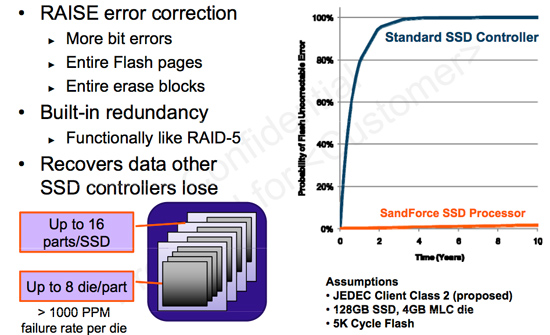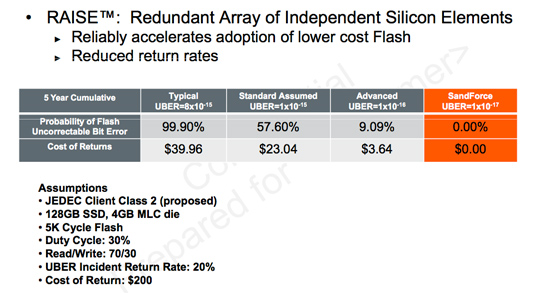Western Digital SiliconEdge Blue Review: WD Enters the Consumer SSD Market
by Anand Lal Shimpi on March 3, 2010 12:00 AM EST- Posted in
- Storage
Scrambling Data to Improve Reliability?
I secure erase all SSDs before I run any test, unless I'm testing used performance. On a modern SSD, performing an ATA Secure Erase takes anywhere from 30 - 50 seconds in most cases. The first time I went to secure erase the SiliconEdge Blue it took almost 17 minutes. I asked Western Digital what was going on, and got an interesting explanation.
The smaller NAND flash gets, the more prone the cells are to developing bit errors. That's why SandForce made such a big deal out of its controllers making 34nm possible thanks to extra error correction and redundancy.


SandForce's controllers attempt to fix bit errors in order to enable the use of cheaper MLC NAND
Western Digital found that writing certain combinations of data were more prone to generating these bit errors on smaller dimension flash (< 50nm). To prevent these sorts of errors from cropping up, the controller reorganizes (or scrambles) the data it's fed before writing it to the flash. When you go back to read the data off the flash, it's unscrambled before sending it back to the host controller so you get the data you requested.
![]()
As a side effect, the controller can't simply perform a flash erase to zero out the contents of the drive. Instead the SiliconEdge Blue has to physically write (a F or 0) to every NAND flash cell on the drive itself, which takes some time. On the bright side, WD does this to improve data integrity (or more likely to use cheaper MLC NAND without sacrificing reliability). The only downside is that a secure erase, which you shouldn't need to do that often, will take a long time to complete.










64 Comments
View All Comments
The0ne - Monday, March 8, 2010 - link
Just wanted to say I love those firmware guys at SanDisk! :) Great job guys and keep up the good work.BelardA - Wednesday, March 3, 2010 - link
"SSD will become commoditized (but it won't ever going to be as cheap as mechanical drives!)"Yes they will... in a sense. The same way a Quad Core intel will never become as cheap as a $30 Celeron... or a X1900XTX a $500 card turning into a $100 card - as a $75 ATI 5570 is easily faster... something else will come out that is cheaper and faster.
The HD are hitting the limits of technology. Anything above 1TB are not as reliable as the smaller drives. The densities are too tight and eventually even the smaller drives will be using the same tech.. :( When 4GB drives come out... we'll be seeing even more failures and problems.
But with SSDs, everything is a matter of price today. Its not impossible to make a 2GB or 4GB SSD drive... but just cost.
When memory gets around 10ns and mass-production is up to much higher standards... then we'll see SDDs replace HDs. The benefits are very good, its still baby tech. Compare a 1986 HD to a 1990 HD, the 80s drives where every bad in reliability & speed. The 1990 drives don't even compare to the 1995 or 2000 drive.
The HDs will eventually go away to be replaced by cheaper and faster SSDs... it won't be next year... but I'd project that in 4~5 years, SSDs will make up 50% of the market... Most people just don't need 2~4TB drives. What is needed is a $75 120GB drive, $100~120 256GB and a $150~175 500GB drive. We're not even close to that today.
And in 1-2 years from now, I expect reliability to be much better.
WD new drives are not impressive. I'll stick with the intels.
Voo - Wednesday, March 3, 2010 - link
"What is/will be important is the interface and the optimization of the SSD drives"The interface? Well that would be SATA, so that's a moot point. And optimization? That's exactly what they didn't do here. Also just because they know how to build a HDD that won't help them a bit for flash drives.. completely different technology.
The only thing they could have going for them would be more reliabilty and that's to be seen. At the moment these drives are too expensive and do not offer exceeding performance..
Also just because you're big doesn't mean you can't fail - wouldn't be a first in the industry..
Frallan - Wednesday, March 3, 2010 - link
Sinca Anand was way to kind to WD I will summarize the testing he has done:
WD want us to pay through the nose for a drive with mediocre performance because they say that it is "more" compatible then other drives however they will not guarantee this!
Since WD is trying to butt-feck us I suggest the put this drive where the sun do not shine and usr Dijon mustard as a lube.
Just my $0.02
Pessimism - Wednesday, March 3, 2010 - link
only if its grey poupon.BCarr - Wednesday, March 3, 2010 - link
I see newegg is selling the 256gb for $799, better but not quite there, since other brands are selling for $600-$750.c4v3man - Wednesday, March 3, 2010 - link
I agree with the other poster. Samsung SLC SSD's that are the standard of the OEM industry are slower, more expensive, but more reliable than what an enthusiast would purchase. Pretty much the exact same description that these drives have. I'm betting this is primarily targeted at OEM's, and they are simply releasing them into the retail market to start a buzz before they release a WD Black SSD sometime in the future. If anything, this will double capacity of most OEM offerings for little to no increase in cost. With the crazy markup they're offering, they're also justifying their partners charging you an exorbitant amount of money to upgrade to SSD when configuring your system.7Enigma - Wednesday, March 3, 2010 - link
I think WD's marketing/pricing department fell asleep back in 2008. What are they thinking? My only guess is they are banking on pre-built systems where companies such as Dell/HP/etc. already have agreements with them. They want the ram upgrade pricing for their SSD's. Otherwise, what a joke.It's always nice to see another player enter the fray, but I'd hate to see these drives selling at MSRP as your only option when buying a system due to the weight WD has in the storage market.
Pessimism - Wednesday, March 3, 2010 - link
I'll pass. They are the new VIA, delivering one unstable, standards uncompliant product after another.Mr Alpha - Wednesday, March 3, 2010 - link
What if I've read through the SSD Relapse five times already and am interested in learning even more about how SSDs work?